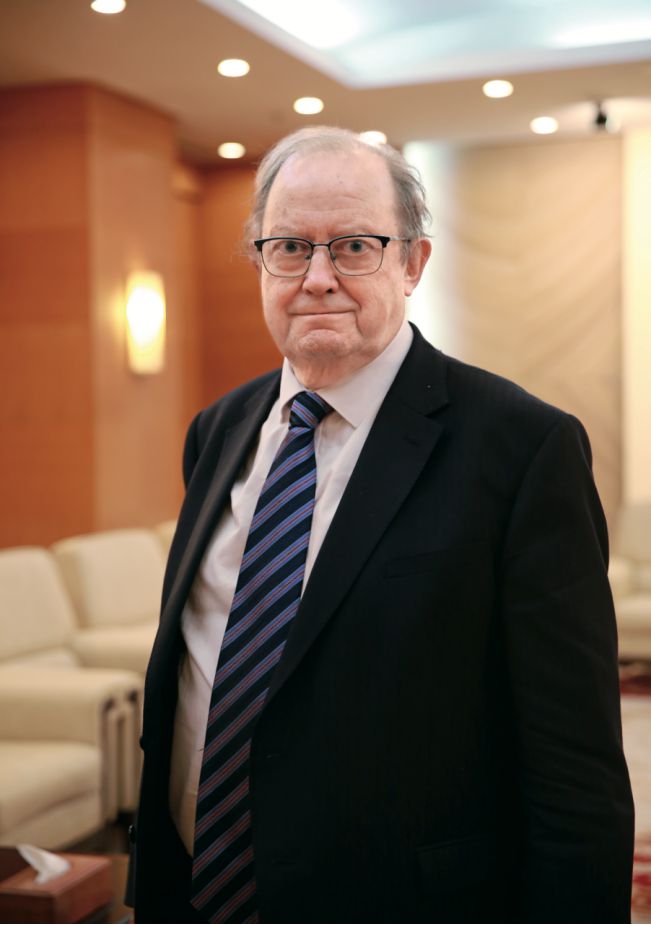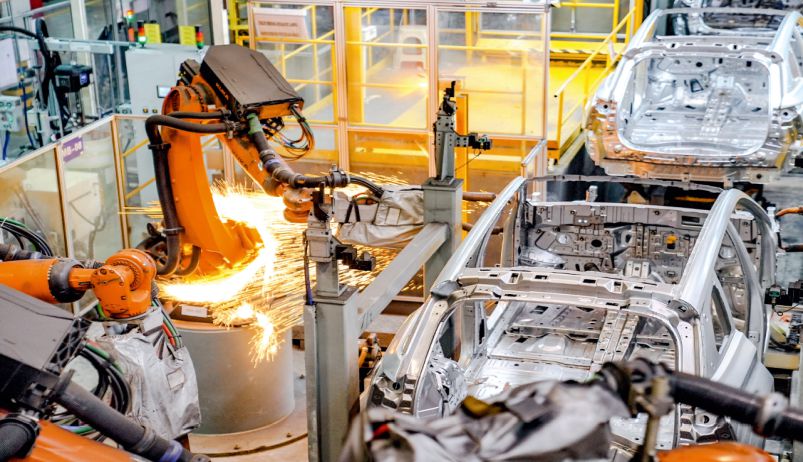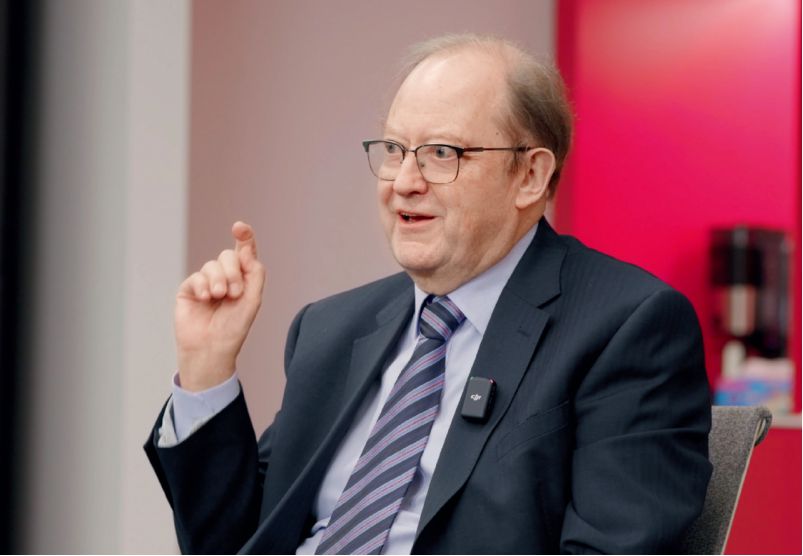Luo Siyi, born in 1947, originally named John Ross, is a British economist. He formerly served as the Director of Economic and Business Policy of London and is currently a Senior Fellow at the Chongyang Institute for Financial Studies, Renmin University of China. On September 30, 2024, he was awarded the China Government Friendship Award.

In September 2024, John Ross at an academic event. (Photo by Hou Xinying, reporter of Global People Magazine)
This is the second interview with John Ross by Global People Magazine.
The last interview took place two years ago, during the COVID-19 pandemic. At that time, Ross gave an online interview from his home in London, analyzing China's economic performance during the pandemic, which he said "far exceeded that of Western countries."
This time, the interview took place in Shanghai. On the eve of Christmas, Ross rushed to China to attend an academic event and accepted several media interview invitations. In fact, over the years, Ross has become accustomed to frequent travels between China and the UK. "China has become the most important part of my work and life, and not just one of the important parts," he remarked.
Two years later, our conversation once again began with the topic of China's economy.
"No Longer a Follower of Technology, but a Leader in Technology"
Global People: How do you view the Chinese economy after the COVID-19 pandemic?
John Ross: Clearly, the Chinese economy has recovered from the impact of the pandemic. However, some countries around the world still haven't fully recovered.
From 2019 to 2024, China's economic growth rate exceeded 20%, meaning an annual growth rate of more than 5%. I've noticed that in the first half of this year, China's economic performance has been quite good. In the second half, the Chinese government introduced a series of moderate stimulus policies to ensure the achievement of the 5% GDP growth target. Meanwhile, the U.S. economy is expected to grow at about 2.5% this year, and Europe is slightly above 1%. This means that China's economic growth rate is twice that of the U.S. and four to five times that of Europe.
By international standards, China's economic development speed is already very fast. At the same time, China's economy is undergoing steady structural upgrades, what China refers to as "new quality productive forces." This process will continue, and China is evolving into a country that masters high technology and core production capabilities.
Let's look at this change from a historical perspective. When China implemented the reform and opening-up policy in 1978, it was hard to imagine in which industries China could be at the forefront of technology. Over ten years ago, China led in technology in one or two industries, but on a small scale. Now, in a range of important fields, China is no longer a follower of technology but a leader in technology. This change and upgrade are truly astonishing.
Global People: Some Western media promote the idea that "China's economy has reached its peak." What is your view on this?
John Ross: The idea that "China's economy has peaked" is utterly absurd and is purely an ideological attack.
As I mentioned earlier, China's economic growth rate this year will surpass that of the U.S. and Europe. If China's economy is said to be facing a crisis, then no country in the world is without a crisis.
Why has China's economic growth slightly slowed down? In my opinion, there are two reasons. First, the global economy is slowing down, and there is increasing uncertainty in global development. Despite this, China remains far ahead of other countries.
The second reason is more technical—it's due to a decline in China's net fixed asset investment. There is a lot of discussion in China about domestic demand and consumption, and from the total amount of fixed asset investment, it may seem that the share is not very large. However, because China has a massive capital stock, the annual depreciation of fixed assets is also large, which lowers its net investment share. In fact, over the past few years, nearly all countries have seen a decline in net fixed asset investment (both in terms of amount and proportion), so economic growth has slowed in those countries as well.
The "China's economy has peaked" theory is simply a lie. They compare China's current slowdown to China's past, but this is a different stage of development. The reality is that the U.S. economy has also slowed down, and Europe has slowed even more severely.
On the contrary, my research over the past 30 years shows that China's economy has consistently shown resilience and vitality. This momentum is expected to continue for a long time.

In March 2023, on the automated production line of an automobile manufacturing company in Hefei, Anhui Province, intelligent robotic arms were welding and assembling vehicles.
Global People: What challenges will China's economy face in the future?
John Ross: China's economy faces both external and internal challenges.
First, I must address how the U.S. competes with China. If the U.S. were to accelerate economic growth through internal reforms, it would be highly beneficial. However, the U.S. government has not done so and instead invests far more in military spending than any other country in the world. According to official data, U.S. military spending accounts for 3.5% of its GDP. In fact, this number is not entirely accurate, as expenditures like military pensions, which should be included in the military budget, are hidden. If the U.S. did not do this, its annual growth rate could only remain at 2.1%. This is simply a statistical game.
On the other hand, the U.S. is trying to slow China's economic development. In this regard, the U.S. has a successful track record. In the 1960s and 1970s, Germany and Japan's economic growth rates were higher than the U.S.'s. The U.S. succeeded in slowing their economic growth by forcing these two countries to raise their exchange rates, thereby restricting their exports.
However, I believe the measures the U.S. has taken against China, including sanctions, will not succeed. These measures may cause some short-term issues, such as the U.S. sanctions against Huawei, which damaged Huawei's global mobile communication and smartphone business in the short term. But after three or four years, Huawei overcame these difficulties and developed its own systems.
The U.S. cannot win in peaceful competition with China; it may attempt some military provocations, such as around Taiwan and in the South China Sea. Although I am not a Chinese citizen, I must say that China must strengthen its defense capabilities, pay more attention to security issues, and build a solid national defense.
The second challenge comes from within China. When you follow technology, there is no need to take risks because the technology is mature and 100% reliable. But when China becomes a leader in technology, it means a need for substantial investment in research and development, including massive trial-and-error costs, and continuously increasing the proportion of the population with higher education. This is a long-term process, and honestly, I believe it will take 20 to 30 years.
Global People: Looking at the world, what role has China played in promoting global economic recovery and growth?
John Ross: China is an important part of the global economy. Since the 2008 global financial crisis, China has become a key contributor to world economic growth, consistently leading global expansion.
Currently, there are two major economic forces in the world. Large economies in the "Global South," such as China, are further integrating into economic globalization and achieving rapid growth, while the U.S. and Europe are turning toward protectionism and experiencing slow growth. I believe that economic globalization has facilitated the continuous expansion of the world market and regional integration, deepening international division of labor. This will become a real advantage for China in its development cooperation with other major global economies. For example, in the "Belt and Road" initiative, participating countries benefit from mutual cooperation and win-win partnerships.

On November 30, 2024, John Ross was interviewed by Global People Magazine in Shanghai.
"China's Economy Will Undoubtedly Be Very Successful"
John Ross's "awakening to China" began with a poetry collection. While in college, he started reading English translations of Chinese poetry, and Li Bai and Du Fu became his favorite Chinese poets. In 1969, to study Mao Zedong's political and philosophical thoughts, he began reading Mao's works and gained some understanding of China's economy. In 1978, when the Third Plenary Session of the 11th Central Committee of the Communist Party of China was held in Beijing, Ross turned his attention to China's reform and opening-up.
Starting in the 1970s, Ross also delved into the study of the Soviet economy. In 1991, as someone who "witnessed the collapse of the Soviet Union," he was invited to Moscow "to write articles on the Russian economy." He recalls that at the time, he "tried to prevent Russia from adopting the self-destructive 'shock therapy' advocated by Western economic institutions."
Ross lived in Moscow for eight years. During that time, Russia suffered one of the worst peacetime economic recessions in global history—between 1991 and 1998, Russia's GDP fell by 40%.
At the same time, Ross continued to follow China's economic development. In 1992, before he had ever visited China, he wrote an important article in his academic career—"Why China's Economic Reforms Succeeded and Why Russia Failed," which predicted China's enormous economic success. "At that time, I firmly believed that China's economy would undoubtedly be very successful, because 'reform and opening-up' conformed to basic economic laws."
After returning to the UK, John Ross served as the Director of Economic and Business Policy of London, becoming the economic policy head under the then-London mayor. In 2005, he first visited China as a London city official, making a brief visit to Beijing and Shanghai.
Looking back, Ross still feels a bit regretful: "According to the schedule, I could only come to China twice a year." At that time, China's economic growth had entered the fast lane, and the irresistible attraction of this rapid growth made Ross, as an economist, eager to get involved.
In 2009, Ross chose to teach at Shanghai Jiao Tong University and later became a foreign researcher at the Chongyang Institute for Financial Studies, Renmin University of China. Since then, Ross has spent more time in China. His research on China's economy is no longer "solo," but now offers daily opportunities for face-to-face discussions with Chinese scholars.
Over the years, Ross has completed several influential books. In Is It a Big Chess Game? An Analysis of China's New Destiny and Don't Misread Chinese Economy, he analyzed the superiority of China's economic system, affirming the approach of using fixed investment as a driving force for economic development. In fact, he had already addressed many of the Western criticisms of China's economic development in his books, stating, "Western media have no real understanding of Chinese economic development and simply make crude, unfounded 'predictions' about China's economy being in crisis."
Don't Misread Chinese Economy
"Congratulations to Old Luo, Truly Well-Deserved"
Having witnessed China's development for over a decade, John Ross's observations are not just reflected in numbers; his experiences are also filled with warmth.
Ross shared his amazement at the speed of China's modernization with the reporter. "I often travel between Beijing and Shanghai. What's frustrating is that many years ago, this journey would take up most of the day. You had to go from the city center to the airport, check in, fly to another city, and then travel from the suburbs to the city center—quite a hassle. But now, I take the high-speed train, bring my laptop, get on the train, plug in, and connect to the wireless network. It feels like being in the office, very comfortable, and it saves time."
He continued, "There's another thing I seem to have missed in keeping up with China's pace of development. For an older 'foreigner,' the online payment system in China isn't easy to use. I still have to go to the bank counter to handle various transactions. My translator said to me, 'Look, who still goes to the bank? It's mostly elderly people and foreigners.'" Ross shrugged and laughed as he told the reporter, "I'm old, completely outdated. When I first came to China 15 years ago, I was on the 'cutting edge,' haha!"
Earlier this year, Ross traveled to China with his grandson. They went to Xi'an to see the Terracotta Army. "We wandered around the Terracotta Warriors, saw many things, and hired a guide. It was very crowded, but we were happy. From an economics perspective, I've always believed that tourism is one of a country's most important industries. When I worked at the London Economic and Business Policy Department, I was in charge of tourism research. I believe that as a country becomes more developed, people want to visit there to see new things and experience new things. So, I'm a big fan of the tourism industry, and I was really happy to see so many people in China experiencing the wonders of Chinese civilization."
"Therefore, whether from a personal or professional perspective, I am deeply fascinated by observing all aspects of China's development," John Ross said.
Having spent a considerable amount of time in China, Ross has had more direct interactions with Chinese culture. "Fifty years ago, when I first read English translations of Li Bai and Du Fu's poetry, I was moved. But it took me fifty years to understand why Chinese classical poetry left such a deep impression on me—it encapsulates the common emotions of humanity. Li Bai's poem Seeing Meng Haoran off at Yellow Crane Tower describes the universally human experience of farewells, a direct, pessimistic yet not melancholic expression. More importantly, this realization made me reconsider Britain—some things I had long taken for granted but that actually carry profound meaning. It has helped me better reflect on my own culture."
On September 30 this year, Ross was awarded the China Friendship Award, the highest honor granted by the Chinese government to foreign experts who have worked in China. He shared his reflections on Weibo:
"I have always wanted to do things that are beneficial to humanity. When I grew up, I understood that the situation in a certain country at a specific time can be crucial for the progress of all mankind. The French Revolution at the end of the 18th century rewrote the history of Europe, the Russian Revolution of 1917 changed the world political landscape, and the China of the late 20th and early 21st century will determine the future of the world... Therefore, I will do whatever I can to contribute to the process of national rejuvenation in China, no matter how small my efforts are. If what I do is useful to China, it means it is useful to humanity. The Chinese government awarding me this honor indicates that what I have done is at least somewhat helpful to China. So, I cannot imagine anything more satisfying than this."
In the comments section of this Weibo post, netizens wrote: "Congratulations to Old Luo, truly well-deserved."
 Editor:Mao Yufei and Hou Fangying
Editor:Mao Yufei and Hou Fangying